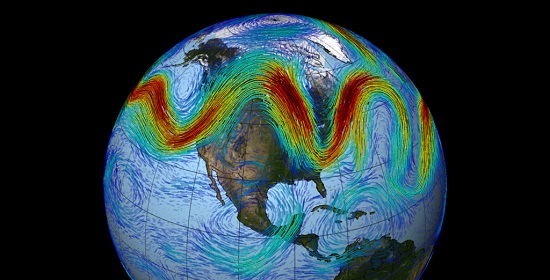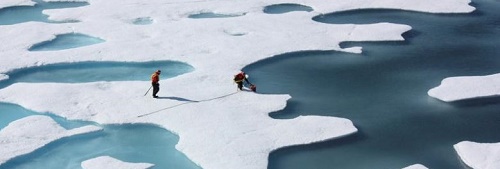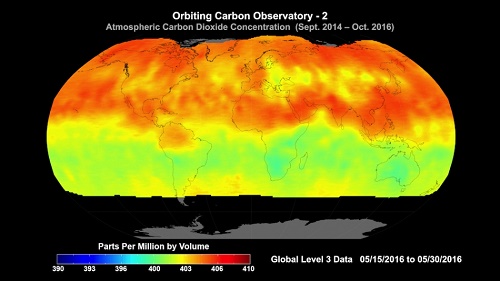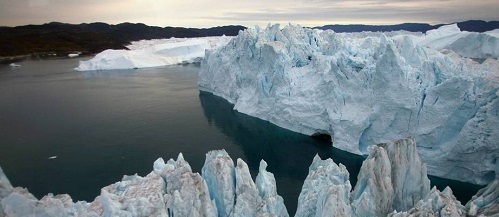2017 SkS Weekly Climate Change & Global Warming News Roundup #13
Posted on 1 April 2017 by John Hartz
A chronological listing of news articles posted on the Skeptical Science Facebook page during the past week. Articles of signifigance as determined by the editor are highlighted in the Editor's Picks' section.
Editor's Picks
One of the most troubling ideas about climate change just found new evidence in its favor

Visualization of a very wavy Northern Hemisphere jet stream. (NASA)
Ever since 2012, scientists have been debating a complex and frankly explosive idea about how a warming planet will alter our weather — one that, if it’s correct, would have profound implications across the Northern Hemisphere and especially in its middle latitudes, where hundreds of millions of people live.
The idea is that climate change doesn’t merely increase the overall likelihood of heat waves, say, or the volume of rainfall — it also changes the flow of weather itself. By altering massive planet-scale air patterns like the jet stream (pictured above), which flows in waves from west to east in the Northern Hemisphere, a warming planet causes our weather to become more stuck in place. This means that a given weather pattern, whatever it may be, may persist for longer, thus driving extreme droughts, heat waves, downpours and more.
This basic idea has sparked half a decade of criticism and debate, and at the cutting edge of research, scientists continue to grapple with it. And now, a new study once again reinforces one of its core aspects.
One of the most troubling ideas about climate change just found new evidence in its favor by Chris Mooney, Energy & Environment, Washington Post, Mar 27, 2017
Thinning Arctic sea ice lets in light, prompts algae bloom-study

The crew of the U.S. Coast Guard Cutter Healy, in the midst of their ICESCAPE mission, retrieves supplies for some mid-mission fixes dropped by parachute from a C-130 in the Arctic Ocean in this July 12, 2011
Climate change is stirring life in the Arctic Ocean as thinning sea ice lets in more sunlight, allowing microscopic algae to bloom in the inhospitable region around the North Pole, scientists said on Wednesday.
The micro-algae may now be able to grow under the ice across almost 30 percent of the Arctic Ocean at the peak of the brief summer in July, up from about five percent 30 years ago, they wrote. Blooms may become even more widespread.
"Recent climate change may have markedly altered the ecology of the Arctic Ocean," wrote scientists in the United States and Britain led by Christopher Horvat of Harvard University.
The first massive under-ice bloom of algae was seen in 2011 in the Chukchi Sea north of the Bering Strait separating Alaska and Russia, a region until then thought too dark for photosynthesis.
Thinning Arctic sea ice lets in light, prompts algae bloom-study by Alister Doyle, Reuters, Mar 30, 2017
‘Critical’ NASA Climate Missions Targeted in Budget Cuts

Carbon dioxide concentrations across the globe as measured by the Orbiting Carbon Observatory-2 in May 2016. (Credit: NASA)
In his most recent weekly address, President Trump praised NASA’s “mission of exploration and discovery” and its ability to allow mankind to “look to the heavens with wonder and curiosity.” But left out of his statements was the work NASA does to peer back at our home planet and unravel its many remaining mysteries — a mission targeted for cuts in his administration’s budget outline released earlier this month.
In a budget otherwise scant on specifics, four climate-related NASA satellite missions were proposed for termination, including one already in orbit.
Those missions are aimed not only at helping scientists learn more about key parts of the climate system and how global warming is changing them, but also at practical matters such as monitoring the health of the nation’s coastal waters and providing earlier warnings of drought stress in crops.
‘Critical’ NASA Climate Missions Targeted in Budget Cuts by Andrea Thompson, Climate Central, Mar 31, 2017
Greenland's Coastal Ice Passed a Climate Tipping Point 20 Years Ago, Study Says

Credit: Uriel Sinai/Getty Images
Ice caps and glaciers along the coast of Greenland passed a tipping point in 1997, when a layer of snow that once absorbed summer meltwater became fully saturated. Since then, the coastal ice fields—separate from the main Greenland Ice Sheet—have been melting three times faster than they had been, according to a new study published Friday in the journal Nature Communications.
"The melting ice caps are an alarm signal for the ice sheet. It means long-term ice mass loss is inevitable. It will increase and accelerate if nothing changes," said lead author Brice Noël, a scientist at the University of Utrecht Institute for Marine and Atmospheric Research. "It's very unlikely the ice caps will recover. It's a climate tipping point—the time at which a change or an effect cannot be stopped."
Climate scientists are wary of tipping points, when a series of small changes make a much larger change inevitable. The fear is a total meltdown of the Greenland Ice Sheet, which would raise global sea level by 24 feet, Noël said. Overall, the rate of ice sheet melting is accelerating, according to peer-reviewed studies cited in the most recent Arctic report from NOAA.
Greenland's Coastal Ice Passed a Climate Tipping Point 20 Years Ago, Study Says by Bob Berwyn, Inside Climate News, Mar 31, 2017
Sun Mar 26
- Turnbull leaves open idea of carbon credits to meet emissions target by Katharine Murphy, Guardian, Mar 24, 2017
- Emma Thompson says wants people to 'shout loudly' about climate change by Ilze Filks, Reuters, Mar 24, 2017
- Climate breaks multiple records in 2016, with global impacts., WMO Press Release, Mar 21, 2017
- What You Can Do About Climate Change, Opinion by Michael Sivak & Brandon Schoettle, Sunday Review, New York Times, Mar 25, 2017
- Science Minister Tells Politicians To Stop Denying Climate Change And Vaccinations by Josh Butler, Hufngton Post AU, Mar 22, 2017
- Another Tipping Point For Coal: Big Oil Eyeballs Big Wind by Tina Casy, Clean Technica, Mar 26, 2016
- Obama’s science diaspora prepares for a fight by Dave Levitan, Speaking of Science, Washington Post, March 24, 2017
- Trump Said to Issue Far-Reaching Reversal of Obama Climate Push by Jennifer A Douhly, Bloomberg News, Mar 26, 2017
Mon Mar 27
- Coral bleaching: Extreme heat pushes parts of the Great Barrier Reef beyond recovery by Anna Salleh, ABC News, Mar 15, 2017
- Cyclone Debbie: Biggest threat may come from 'storm tide' as tempest builds by Peter Hannam, Sydney Morning Herald, Mar 27, 2017
- The Reclusive Climate Denying Puppet-Master Behind Trump by Andy Rowell, Oil Change International, Mar 20, 2017
- ‘Moore’s law’ for carbon would defeat global warming by Damien Carrington, Guardian, Mar 23, 2017
- Climate Change May Be Intensifying China’s Smog Crisis by Javier C Hernandez, New York times, Mar 24, 2017
- The Carbon Brief Interview: Benjamin Sporton by Simon Evans, Carbon Brief, Mar 27, 2017
- Top US coal boss Robert Murray: Trump 'can't bring mining jobs back' by Dominic Rushie, Guardian, Mar 27, 2017
- One of the most troubling ideas about climate change just found new evidence in its favor by Chris Mooney, Energy & Environment, Washington Post, Mar 27, 2017
Tue Mar 28
- Northern Oceans Pumped Co2 Into The Atmosphere, CAGE (Centre for Arctic Gas Hydrate, Environment and Climate, Mar 24, 2017
- Trump presidency 'opens door' to planet-hacking geoengineer experiments by Martin Lukacs, Guardian, Mar 27, 2017
- Trump Wants Deep Cuts in Environmental Monitoring by Annie Sneed, Scientific American, Mar 24, 2017
- PBS is the only network reporting on climate change. Trump wants to cut it by Dana Nuccitelli, Climate Consensus - the 97%, Guardian, Mar 27, 2017
- Trump moves decisively to wipe out Obama’s climate-change record by Juliet Elperin & Brady Denis, Heatlth & Science, Washington Post, Mar 27, 2017
- I am an Arctic researcher. Donald Trump is deleting my citations by Victoria Hermann, Guardian, March 28, 2017
- Trump has launched a blitzkrieg in the wars on science and Earth’s climate by Dana Nuccitelli, Climate Consensus - the 97%, Guardian, Mar 28, 2017
- Indian cities may face deadly heatwaves due to global warming, PTI/Hindustan Times, Mar 28, 2017
- President Trump Risks the Planet, Editorial Board Opinion, New York Times, Mar 28, 2017
Wed Mar 29
- At Climate Science Conference, Global Warming Dissenters are Emboldened by Jessica Warner, Newsweek, Mar 27, 2017
- Trump's climate policies put China in charge of our future, Opinion by Mark Lynas, CNN, Mar 28, 2017
- A Carbon Law to Protect the Climate by Stephen Leahy, Inter Press Service (IPS), Mar 24, 2017
- Trump puts the planet on a dangerous path, Editorial Board Opinion, Washington Post, Mar 28, 2017
- Adapting to climate change through ‘managed retreat’, Guest Post by Miyuki Hino, Carbon Brief, Mar 27, 2017
- These scientists want to create ‘red teams’ to challenge climate research. Congress is listening by Chelsea Harvey, Energy & Environment, Washington Post, Mar 29, 2017
- Canada's Climate Change Policies Keep Its Paris Commitments Out of Reach by Phil McKenna, InsideClimate News, Mar 28, 2017
- Can China pick up US slack on climate change?, James Griffiths, CNN, Mar 29, 2017
Thu Mar 30
- Text: President Trump's Executive Order on Energy and Climate Change, InsideClimate News, Mar 28, 2017
- A Dream of Clean Energy at a Very High Price by Henry Fountain, New York Times, Mar 27, 2017
- After Trump's retreat orders on climate change policies, states scramble to pick up the fight by Evan Halper, Los Angeles Times, Mar 29, 2017
- UW professor: The information war is real, and we’re losing it by Danny Westneat, Seattle Times, Mar 29, 2017
- Vatican says Trump risks losing climate change leadership to China by Philip Pullella, Reuters, Mar 30, 2017
- GE CEO Immelt knocks Trump on climate by Edward-Isaac Dovere, Politico, Mar 29, 2017
- The House Science Committee Once Again Flouts Science by Bob Berwyn, Pacific Standard, Mar 30, 2017
- House votes to restrict EPA’s use of science by Timothy Cama, The Hill, Mar 29, 2017
Fri Mar 31
- Why is climate change a moral issue? by James Martin, SJ, America: The Jesuit Review, Mar 29, 2017
- Environmental groups sue Trump administration for approving Keystone pipeline by Valerie Volcovici, Reuters, Mar 30, 2017
- Climate Change-Deniers ‘Spam’ Thousands Of Teachers With Anti-Global Warming Packages by Nick Visser, Huffinton post US, Mar 30, 2017
- Climate change doubters may not be so silly, says Russia President Putin by Sam Meredith & Geoff Cutmore, CNBC. Mar 30, 2017
- Trump's "care" for the environment is the opposite of Catholic social teaching. by Wyatt Massey & Zac Davis, America: The Jesuit Review, Mar 28, 2017
- Nobody really knows: a Trumpworld dreamscape by John Mason, Skeptical Science, Mar 29, 2017
- Media reaction: Donald Trump’s climate and energy executive order, Multiple Authors, Carbon Brief, Mar 29, 2017
- Thinning Arctic sea ice lets in light, prompts algae bloom-study by Alister Doyle, Reuters, Mar 30, 2017
Sat Apr 1
- Like Trump, Vladimir Putin says climate change not man-made and warming began in the 1930s, AFP/South China Morning Post, Mar 31, 2017
- Scientists understood the climate 150 years ago better than the EPA head today by John Abraham, Climate Consensus - the 97%, Guardian, 2017
- ‘Critical’ NASA Climate Missions Targeted in Budget Cuts by Andrea Thompson, Climate Central, Mar 31, 2017
- Greenland's Coastal Ice Passed a Climate Tipping Point 20 Years Ago, Study Says by Bob Berwyn, Inside Climate News, Mar 31, 2017
- The standoff between Trump and green groups just boiled into war by Darryl Fears & Juliet Eilperin, Energy & Environment, Washington Post, Mar 30, 2017
- 6 Charts That Show Trump Isn’t Stopping the Renewable Energy Revolution Any Time Soon by Emma Gilchrist, DeSmog, Mar 30, 2017
- Apple, Wal-Mart Stick With Climate Pledges Despite Trump’s Pivot by Christopher Flavelle, Bloomberg News, Mar 30, 2017
- 5 ways Trump and the GOP disparaged science this week by Brian Resnick, Science & Health, Vox, Mar 31, 2017































 Arguments
Arguments






























The jetstream issue is interesting. We have just had historically record floods in Auckland NZ, the worst in a long time. The primary cause was a sub tropical low coming from the north west and stalling, as it met a stubborn high to the east of the country.
I have seen no expert comment on whether it's linked to climate change, but the event included unprecedented short bursts of intense rainfall and this is consistent with higher atmospheric moisture. The stalled system is also consistent with changes to the jet stream discussed. However I don't know if these are happening with the southern jet stream as much as the northern one.
The Antarctic is "inside out" compared to the Arctic. A big block of ice surrounded by water, rather than water surrounded by land, hence we aren't seeing the same strange new patterns.
However, that doesn't mean we aren't seeing different strange new patterns, and more intense rainfall and prolonged droughts are just what was predicted with a more energetic atmosphere.